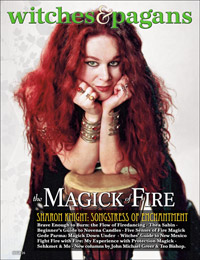Out of the Frying Pan…
 When it comes to passion, we’ve got it. Common sense, not so much.
When it comes to passion, we’ve got it. Common sense, not so much.
As most readers of this magazine are undoubtedly aware, we Pagans had a wee bit of media attention earlier this spring. A “Fox and Friends” segment in February characterized Wiccans as “compulsive Dungeons and Dragons players or middle-aged, twice-divorced older rural women working as midwives.” The reaction in the Pagan community was nothing short of explosive: within days, more than 40,000 of us signed petitions at change.org and causes.com demanding an apology. In less than a week, a chastened Fox pundit offered his “sincere [ahem] regrets.”
Another triumph for truth, justice, and the American way? Well, maybe. As soon as the brouhaha blew up I was struck by how much attention was being paid to Fox & Friends’ trollish shenanigans and how little to the good news that formed the actual foundation of the story. The decision by the University of Missouri to include Wiccan holidays in their inter-faith campus calendar is a concrete example of the increasingly respectful treatment that Pagan faiths are receiving these days, the fruit of decades of anti-defamation work by groups like the Lady Liberty League. But in spite of this genuinely excellent news, there was hardly a mention of this angle of the story in the coverage by Pagan pundits. With the notable exception of the Covenant of the Goddess — which made a thank-you to the University part of their press release — the buzz consisted almost entirely of righteous indignation.
Outrage has become the lingua fraca of many subcultures in today’s polyglot society. Many groups — including Christian triumphalists who see every “winter holiday” not labeled as Christmas as a sign of the secular apocalypse, and the radical Islamists who riot over every Danish cartoon of the Prophet — use a deliberately inflamed sense of persecution to reinforce their sense of community by inciting their followers to feel “affronted together.”
As a newly-minted religious minority just beginning to enter the mainstream, we Pagans should be especially wary of “touchy-nerve-syndrome.” It should go without saying that bonafide cases of discrimination against members of our movement deserve, and even require, vigorous action to defend our rights to equal protection under the law, but it is essential for us to recognize that we have no constitutional right to not be insulted.
Lacking a single charismatic leader, holy book, or unifying mythology to rally around, our community is uniquely susceptible to the temptation to embrace outrage in order to feel a sense of connection with one another. This is unwise, if understandable. (Though it would be a shame if the only thing we could agree upon is that we hate Tucker Carlson.) But complicating this conundrum further, many of us fail to distinguish our own spiritual technologies from fairy tale magic and have allowed our identities as post-modern Pagans/Wiccans/witches/polytheists/ Heathens to become entangled with the lore and legend of mythical beings.
This leads to an unfortunate tendency to react strongly not only to actual cases of discrimination against our co-religionists, but every time a fairy-tale magick-flinger gets his or her karmic comeuppance on the silver screen. I’ve seen Pagan spleen vented at Season of the Witch, Hansel & Gretel: Witchhunters, and Beautiful Creatures. To which I ask: why, Goddess, why, do we give this dreck the time of day?
We are part of a vibrant movement of faith communities with sophisticated belief systems, a burgeoning set of organizations, and even some nascent cultural respect. We no longer need (if we ever did) to borrow our mana from the Grimm brothers, Marvel comics, and Joss Whedon. Stressing out every time some fictional bad-ass skewers a witchy evil-doer is absurd — and makes us look like even we don’t know the difference between fantasy spellcasters and real-life Pagans.
Adding a solid dose of discernment to our sense of moral outrage would do us (and the work of defending Pagan civil rights) a world of good.
We can’t continue getting up in arms over every unflattering depiction of a Wicked Witch and expect ordinary people to take us seriously. After all, the Dorothy Gales of this world can always be counted upon to throw the cold water of common sense on our puffed-up sense of magickal exceptionalism — and we’ll look awfully silly shrieking “I’m a Good Wiccan, not an evil Witch!” as we dissolve into a pool of cultural irrelevancy.
P.S. If our community wants to get worked up about something, maybe we should consider protesting the real-life witchhunting taking place in sub-Saharan Africa and Papua New Guinea.
Table of contents in PDF format. Mini flash-view of this issue.
Own the digital edition, readable with any PDF reader, for just $6.95.
{nicedownloads:36|http://witchesandpagans.com/images/buttons/btn_buy-download_126_171x.gif}
- OR -

- OR - Save by subscribing to Witches&Pagans magazine.















